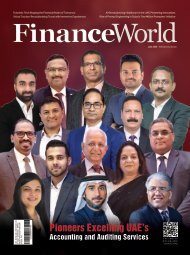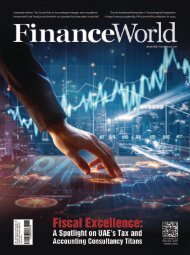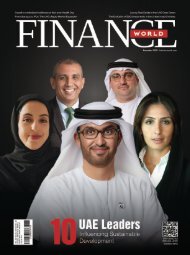The Finance World Magazine| Edition: March 2023
The March edition of The Finance World Magazine (TFW) delves into the Zayed Ambition 2 project, which strives to investigate the feasibility of leveraging the UAE's burgeoning space economy for sustainable development. This initiative showcases the country's commitment to diversifying its economy and reducing its reliance on oil. In a featured interview, CEO Shaaista Khan Osman and Managing Director Osman Osman of Blu Blood share their insights about the event management industry in the UAE. This issue also includes insights from Sridhar Vembu, CEO of Zoho Corporation, on emerging AI tools, along with some advice for SMEs and startups. Through this edition, we also bring you insights on topics like the UAE's steadfast dedication to sustainable growth and development, Dubai surpassing global and regional tourism recovery levels, the sports industry emerging as a promising sector magnetizing international investors, and many more key informational articles in the finance sector. Keep yourself up to date with all financial sector news with our current news segments. Each person can find something unique from us. We believe our readers deserve real value from what we have to offer.
The March edition of The Finance World Magazine (TFW) delves into the Zayed Ambition 2 project, which strives to investigate the feasibility of leveraging the UAE's burgeoning space economy for sustainable development. This initiative showcases the country's commitment to diversifying its economy and reducing its reliance on oil.
In a featured interview, CEO Shaaista Khan Osman and Managing Director Osman Osman of Blu Blood share their insights about the event management industry in the UAE. This issue also includes insights from Sridhar Vembu, CEO of Zoho Corporation, on emerging AI tools, along with some advice for SMEs and startups.
Through this edition, we also bring you insights on topics like the UAE's steadfast dedication to sustainable growth and development, Dubai surpassing global and regional tourism recovery levels, the sports industry emerging as a promising sector magnetizing international investors, and many more key informational articles in the finance sector.
Keep yourself up to date with all financial sector news with our current news segments. Each person can find something unique from us. We believe our readers deserve real value from what we have to offer.
Create successful ePaper yourself
Turn your PDF publications into a flip-book with our unique Google optimized e-Paper software.
a gain or allowed a loss on a realisation<br />
basis only for the assets and liabilities<br />
subject to fair value or impairment<br />
accounting or held on capital account.<br />
This applies to all assets and liabilities<br />
of the respective category.<br />
Assets and liabilities subject to<br />
fair value generally include financial<br />
assets, financial liabilities, investment<br />
property, biological assets measured<br />
at fair value less cost to sell, and<br />
intangible assets acquired in a<br />
business combination. Assets subject<br />
to impairment accounting include<br />
property, plant, and equipment (PPE),<br />
goodwill, intangible assets not acquired<br />
in a business combination, investments<br />
in equity instruments that are not held<br />
for trading, and others.<br />
and all unrealised gains would not<br />
be taxable (and conversely, any and<br />
all unrealised losses would not be<br />
deductible) until they are realised;<br />
2. <strong>The</strong> taxpayer can elect to recognise<br />
gains and losses on a ‘realisation<br />
basis’ for UAE CT purposes for<br />
assets and liabilities held on capital<br />
account only - that is, only unrealised<br />
gains and losses in respect of assets<br />
and liabilities held on capital account<br />
would not be taxable or deductible,<br />
respectively, until they are realised.<br />
Unrealised gains and losses arising<br />
from assets and liabilities held on<br />
revenue account, on the other hand,<br />
would continue to be included in<br />
taxable income on a current basis.<br />
loss) of the business, after making<br />
adjustments for certain items specified<br />
in the Corporate Tax Law.<br />
<strong>The</strong> accounting net profit (or loss)<br />
of a business is the amount reported<br />
in its financial statements prepared<br />
in accordance with internationally<br />
acceptable accounting standards.<br />
Adjustments to the accounting net<br />
profit (or loss) will need to be made<br />
for the following items:<br />
1. Unrealised gains and losses (subject<br />
to the election made regarding<br />
the application of the realisation<br />
principle);<br />
2. Exempt income such as qualifying<br />
dividends and capital gains;<br />
3. Income arising on intra-group<br />
transfers;<br />
Required Adjustments to the<br />
Financial Statements:<br />
<strong>The</strong> corporate tax legislation in the<br />
UAE mandates that the accounting<br />
net profit (or loss) must be modified<br />
to account for various items specified<br />
in the law, which include:<br />
1. Unrealised profits or losses<br />
(depending on how the realisation<br />
principle is applied)<br />
2. Income that is exempt, such as<br />
dividends<br />
3. Transfers between companies within<br />
the same group<br />
4. Deductions that are not permitted<br />
for tax purposes<br />
5. Adjustments for transactions with<br />
related parties and connected<br />
individuals<br />
6. Any tax incentives or relief provided<br />
by the government<br />
7. Any other modifications specified<br />
by the Minister.<br />
How CT Treats Unrealised Gains<br />
and Losses:<br />
Generally, assets and liabilities are<br />
considered to be held on capital account<br />
when they are not expected to be sold<br />
or traded with during the regular course<br />
of the business operation. Where a<br />
business prepares their financial<br />
statements on an accruals basis,<br />
it has the following options in<br />
respect of the UAE CT treatment<br />
of unrealised accounting gains<br />
and losses:<br />
1. <strong>The</strong> taxpayer can elect to recognise<br />
gains and losses on a ‘realisation<br />
basis’ for UAE CT purposes for all<br />
assets and liabilities - that is, any<br />
Taxpayers in the UAE can use the<br />
realization principle to determine<br />
their taxable income under the<br />
country’s CT system.<br />
Realisation Principle:<br />
Similar to other Corporate Tax<br />
systems, the UAE’s CT system permits<br />
taxpayers to use the “realisation<br />
principle” to ascertain their taxable<br />
income. In other words, income will<br />
only be subject to tax, and deductions<br />
may only be taken, when a gain or loss is<br />
realised, such as when the related asset<br />
is sold or terminated. <strong>The</strong> application<br />
of the realisation principle means<br />
that any gains or losses on assets or<br />
liabilities that are subject to fair value<br />
or impairment accounting will not be<br />
included in the taxable income for<br />
each Tax Period.<br />
Taxable Income for UAE CT:<br />
<strong>The</strong> taxable income for a Tax Period<br />
will be the accounting net profit (or<br />
4. Deductions which are not allowable<br />
for tax purposes;<br />
5. Transactions with Related Parties<br />
and Connected Persons;<br />
6. Transfers of tax losses within the<br />
group where relevant;<br />
7. Incentives or tax reliefs; and<br />
8. Any other adjustments as specified<br />
by the Minister.<br />
<strong>March</strong> <strong>2023</strong> www.thefinanceworld.com 85


















